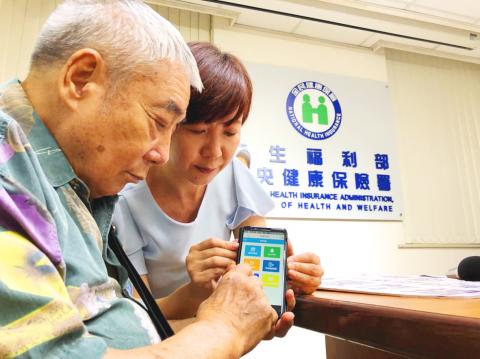More than 920,000 people have registered to use the “My Health Bank” service and there are plans to expand the service to allow direct blood relatives to check the medical history of family members in March, the National Health Insurance Administration (NHIA) said.
Launched in September 2014, the My Health Bank service allows people with National Health Insurance (NHI) to register for an account on the online system and view their own medical history.
The information that users can look up in their account includes their inpatient, outpatient and dental records in the past three years, vaccinations, allergic reactions and prescribed drug use records and examination reports, organ donation or hospice care preferences, and reminders about their next recommended health checkup.

Photo: CNA
My Health Bank users can also insert their height, weight, blood pressure and other measurements to keep track of their own health.
NHIA Director-General Lee Po-chang (李伯璋) on Tuesday said that more than 920,000 people have registered to use the service so far and demographics showed that 46 percent of users are aged between 31 and 50, 53 percent are married, 55 percent are female and 74 percent live in urban areas.
Asked to share his experiences of using the service, entertainer Alvin Hou (侯昌明) said he is often busy working and would forget about the illnesses he has had, so logging into his My Health Bank account allows him to clearly understand his medical history.
He said his father has dementia, chronic hypertension and diabetes, and needs repeated prescriptions, but he had sometimes forgotten to collect the prescriptions due to his busy work schedule, so the service helps to remind him.
The NHIA plans to expand the service for users to also check their parents’ or children’s medical records using their own account in March.
Many middle-aged people have busy work schedules, while having to take care of their elderly parents and children at the same time, so the expanded service is expected to help them manage their family members’ health more easily, Lee said.

Beijing could eventually see a full amphibious invasion of Taiwan as the only "prudent" way to bring about unification, the US Department of Defense said in a newly released annual report to Congress. The Pentagon's "Annual Report to Congress: Military and Security Developments Involving the People's Republic of China 2025," was in many ways similar to last year’s report but reorganized the analysis of the options China has to take over Taiwan. Generally, according to the report, Chinese leaders view the People's Liberation Army's (PLA) capabilities for a Taiwan campaign as improving, but they remain uncertain about its readiness to successfully seize

Taiwan is getting a day off on Christmas for the first time in 25 years. The change comes after opposition parties passed a law earlier this year to add or restore five public holidays, including Constitution Day, which falls on today, Dec. 25. The day marks the 1947 adoption of the constitution of the Republic of China, as the government in Taipei is formally known. Back then the Chinese Nationalist Party (KMT) governed China from Nanjing. When the KMT, now an opposition party in Taiwan, passed the legislation on holidays, it said that they would help “commemorate the history of national development.” That

Trips for more than 100,000 international and domestic air travelers could be disrupted as China launches a military exercise around Taiwan today, Taiwan’s Civil Aviation Administration (CAA) said yesterday. The exercise could affect nearly 900 flights scheduled to enter the Taipei Flight Information Region (FIR) during the exercise window, it added. A notice issued by the Chinese Civil Aviation Administration showed there would be seven temporary zones around the Taiwan Strait which would be used for live-fire exercises, lasting from 8am to 6pm today. All aircraft are prohibited from entering during exercise, it says. Taipei FIR has 14 international air routes and

Snow fell on Yushan (Jade Mountain, 玉山) yesterday morning as a continental cold air mass sent temperatures below freezing on Taiwan’s tallest peak, the Central Weather Administration (CWA) said. Snowflakes were seen on Yushan’s north peak from 6:28am to 6:38am, but they did not fully cover the ground and no accumulation was recorded, the CWA said. As of 7:42am, the lowest temperature recorded across Taiwan was minus-5.5°C at Yushan’s Fengkou observatory and minus-4.7°C at the Yushan observatory, CWA data showed. On Hehuanshan (合歡山) in Nantou County, a low of 1.3°C was recorded at 6:39pm, when ice pellets fell at Songsyue Lodge (松雪樓), a